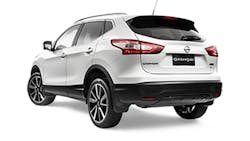Nissan to be Fined for Emissions Cheating in South Korea
South Korea said on May 16 it will fine Nissan (IW 1000/33) for allegedly manipulating emissions data on a popular diesel sports utility vehicle, bringing the Japanese car giant into a widening global scandal that has already ensnared Volkswagen and Mitsubishi.
Seoul said it would order recalls of hundreds of Qashqai model SUVs after tests revealed an emission defeat system that made the vehicle appear to be less polluting than it really was.
The decision follows an investigation into 20 diesel-powered cars that began last December after German carmaker Volkswagen admitted having installed devices aimed at cheating emissions tests in 11 million diesel engines.
Nissan would be fined 330 million won (US$280,000), the environment ministry said on May 16.
"Our investigation... concluded that Nissan illegally manipulated emission data," it said.
Hong Dong-Kon, a ministry official handling transport-related regulations, added: "A group of auto industry experts we consulted with also agreed that this is a clear manipulation of emission data."
State tests showed the Qashqai switched off its emission reduction device when the car temperature reached 35 degrees Celsius to stop the vehicle from overheating, whereas other cars waited until the temperature reached 50 degrees.
The ministry also said that when the Qashqai's emissions reduction device stopped working, the level of emissions was about the same or higher than the Volkswagen cars equipped with emissions-cheating software systems.
Nissan will be given 10 days to present its opinions on the Qashqai issue before Seoul officially carries out punitive measures, the environment ministry said.
VW Crisis
Nissan insisted it "does not manipulate data related to our vehicles" in a statement sent to AFP.
"Nissan has not and does not employ illegal defeat or cheat devices in any of the cars that we make."
The statement added: "Furthermore, following stringent testing and using similar standards to the Korean tests, EU authorities have concluded that Nissan vehicles they tested used no illegal defeat device.
"Although the conclusions reached by the Korean authorities are inconsistent with those of other regulators, Nissan will carefully assess and consider appropriate next steps.
The company said it was "committed to upholding the law" and was "continuing to work with the Korean authorities".
Unlike its rivals Volkswagen and Mitsubishi, Nissan -- Japan's number two automaker -- has so far avoided being embroiled in any emissions or fuel economy cheating scandals.
Mitsubishi last month admitted it had been falsifying fuel-economy tests for years, manipulating data to make cars seem more efficient than they were in reality.
The scandal includes mini-cars produced by Mitsubishi for Nissan as part of a joint venture, but Nissan is said to have had no part in the cheating.
Nissan threw a surprise lifeline to Mitsubishi last week by offering to buy 34% of its shares, but its top executive warned Friday that he would kill the $2.2 billion offer if the Mitsubishi scandal spreads beyond Japan.
VW was plunged into its deepest-ever crisis last September when it emerged it had installed defeat devices into cars all over the world.
The automaker has acknowledged 11 million vehicles are fitted with software that reduces pollution levels only when the car is being tested for emissions.
In late April the company said it was setting aside 16.2 billion euros (US$18.2 billion) in provisions to cover the anticipated costs of the scandal.
Last November Seoul ordered Volkswagen Korea to recall more than 125,000 diesel-powered cars sold in the Korean market and fined the firm 14.1 billion won.
Copyright Agence France-Presse, 2016
About the Author
Agence France-Presse
Copyright Agence France-Presse, 2002-2025. AFP text, photos, graphics and logos shall not be reproduced, published, broadcast, rewritten for broadcast or publication or redistributed directly or indirectly in any medium. AFP shall not be held liable for any delays, inaccuracies, errors or omissions in any AFP content, or for any actions taken in consequence.
